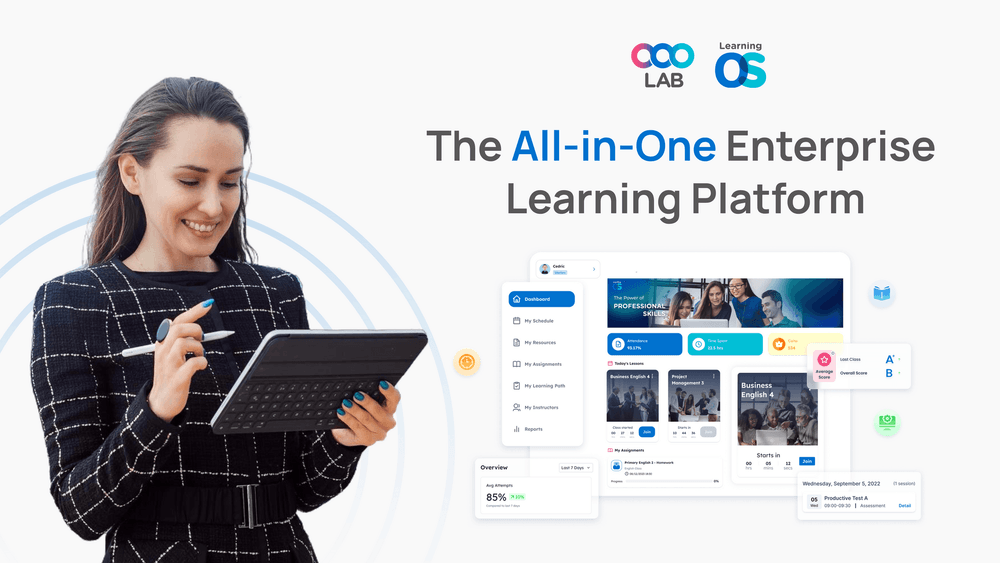

In today’s highly competitive business landscape, organizations, especially large ones, must prioritize learning and development to stay ahead. But traditional training methods often fall short in addressing the unique challenges faced by enterprises, such as managing vast teams, ensuring compliance, and keeping employees engaged across geographies. This is where an Enterprise Learning Management System (LMS) comes into play.
An Enterprise LMS is a powerful digital platform designed specifically for the training and development needs of large organizations. By centralizing training efforts, offering scalability, and enabling advanced analytics, these systems provide numerous benefits that go beyond simple learning delivery. Let’s explore how an Enterprise LMS transforms training and development for large organizations.

An Enterprise LMS is a comprehensive learning management solution tailored to meet the complex needs of large-scale organizations. It goes beyond basic training delivery by offering robust features like multi-language support, integration with existing systems, and advanced reporting.
Unlike standard LMS platforms, Enterprise LMS solutions are built to support scalability, handle diverse training needs, and ensure seamless management of training for a growing workforce. For instance, global corporations like Amazon and Microsoft utilize Enterprise LMS platforms to train their employees consistently across multiple regions.
According to Mordor Intelligence, the LMS market is expected to grow to $37.9 billion by 2026, driven by the increasing need for flexible, scalable training solutions. Large organizations are at the forefront of this shift, leveraging Enterprise LMS tools to manage training for thousands of employees efficiently.
>>> Read more: What is an Enterprise LMS
>>> Read more: Customization Options for Enterprise LMS
>>> Read more: Common challenges when implementing an Enterprise LMS
>>> Read more: Steps to implement an Enterprise LMS
>>> Read more: Enterprise LMS - revolutionizing corporate training and development
One of the standout features of an Enterprise LMS is its scalability. As organizations expand, they need training systems that can grow with them. Whether it’s onboarding hundreds of employees in a new office or rolling out a new compliance module across all teams, an Enterprise LMS provides the capacity to scale without compromising performance.
For example, global tech companies like Google rely on scalable LMS platforms to onboard thousands of employees every year. As teams grow, the LMS adapts, ensuring seamless training delivery.
Managing training programs across multiple departments and regions can be overwhelming. An Enterprise LMS simplifies this by centralizing all training activities on one platform. This centralized approach allows HR and training managers to assign courses, track progress, and analyze outcomes with ease. For instance, a global bank using an Enterprise LMS can streamline its compliance training efforts, ensuring that all employees, from tellers to executives, meet regulatory requirements without gaps.
Training large teams using traditional methods can be expensive. Travel, accommodation, instructor fees, and printed materials add up quickly. An Enterprise LMS eliminates many of these costs by shifting training to a digital platform. According to a study by Brandon Hall Group, companies that use LMS platforms save 40% to 60% on training costs. Additionally, employees spend less time in training sessions, which translates to increased productivity.
Large organizations often need training programs that cater to diverse roles and responsibilities. An Enterprise LMS enables customization of training content and personalization of learning paths, ensuring that every employee gets the most relevant and impactful training. For example, a retail chain can create different training modules for cashiers, store managers, and regional supervisors, each tailored to their specific needs. This personalization boosts engagement and ensures better knowledge retention.
Compliance training is a critical requirement for many industries, including healthcare, finance, and manufacturing. Non-compliance can lead to severe penalties, making it essential for organizations to stay on top of regulatory requirements. An Enterprise LMS automates compliance training by assigning mandatory courses, tracking completions, and generating certifications. This ensures that every employee is up to date on compliance requirements and that the organization is audit-ready at all times.
A robust Enterprise LMS integrates seamlessly with other business systems, such as HR software, CRM platforms, and collaboration tools. This integration streamlines workflows and provides a holistic view of employee performance.
For example, integrating an LMS with an HR system allows training data to sync with employee records. This ensures that promotions, bonuses, or certifications are tied to measurable training outcomes. External sources like eLearning Industry emphasize the importance of such integrations for maximizing the value of an LMS.
In large organizations, making data-driven decisions is key to optimizing training programs. An Enterprise LMS provides powerful analytics tools that track employee progress, identify skill gaps, and measure training effectiveness.n For example, detailed reports can highlight which departments are excelling in compliance training and which need additional support. These insights allow organizations to adjust their strategies for better outcomes, ensuring that no team is left behind.
For organizations operating across multiple countries, language barriers can be a significant challenge. An Enterprise LMS offers multi-language support, ensuring that all employees can access training in their preferred language. This feature is particularly valuable for global teams, where employees in different regions may speak different languages. A company with operations in Asia, Europe, and South America can deliver consistent training while accommodating linguistic diversity.
Engaging employees in training programs is crucial for knowledge retention and application. An Enterprise LMS incorporates features like gamification, social learning, and interactive modules to keep employees motivated. For instance, a company can introduce leaderboards and badges to reward top performers, creating a sense of achievement and healthy competition. Research from Gallup shows that highly engaged teams see 21% higher profitability, underlining the importance of engagement in driving business success.
Technology is evolving rapidly, and businesses need tools that can keep up with these changes. Enterprise LMS platforms are equipped with cutting-edge technologies like artificial intelligence (AI), machine learning, and mobile compatibility to future-proof training initiatives.
AI-powered recommendations can suggest courses based on an employee’s learning history, while mobile-friendly platforms allow employees to access training anytime, anywhere. These features ensure that the LMS remains relevant and effective, even as training needs evolve.
Book Free Demo with us. Bring your Training and Learning to a new height with LearningOS.

An Enterprise LMS is not just a training tool—it’s a strategic investment that drives organizational growth and success. By addressing the unique challenges of large organizations, such as scalability, compliance, and engagement, these platforms deliver unparalleled value.
From reducing costs to enhancing employee performance, the benefits of an Enterprise LMS are clear. For organizations aiming to stay competitive in today’s dynamic business environment, adopting a robust LMS is a crucial step forward.
Explore how an Enterprise LMS can transform your training initiatives and empower your workforce to achieve their full potential. To learn more, check out additional resources on sales training and LMS solutions. With the right Enterprise LMS in place, large organizations can not only meet their training goals but also position themselves for long-term success in a rapidly changing world.
At OOOLAB (pronounced 'uːlæb'), our mission is to make complex learning operations simple. We aim to positively impact the lives of over 1,000,000 learners and educators by the end of 2026.
OOOLAB's LearningOS provides educational institutions and corporate enterprises with an all-in-one solution to create and deliver engaging learning experiences.
We meet organizations' needs or support your growth. We provide undivided attention. We provide:
1. Dedicated success manager: We offer direct communication with a real human who'll discuss your enterprises unique learning operations and goals.
2. Personalized setup: Our team will help you transition to LearningOS on your schedule, one step at a time.
3. Around the clock support: Get help from us any time, and in any time zone.
We have recently launched a new AI training tool, Skill Quotient OS, designed to elevate hybrid training to new heights. It offers role-play exercises with scenarios and assessments.This tool can apply in sales training, corporate development and customer support training in any industry.
Reach out to us at: LinkedIn, FaceBook
1. What are the main benefits of LearningOS
Our platform is easy to use and automates all aspects of your learning operations. It efficiently manages complex tasks, allowing you to concentrate on delivering exceptional learning experiences.
2. What main features does LearningOS offer?
Our all-in-one software solution combines a Content Management System, a Learning Management System, content authoring tools, and a mobile friendly Learner Portal.
3. Can your platform be used for corporate enterprises?
Absolutely! LearningOS is an Enterprise LMS is a great fit for corporate learning. In fact, we have clients with up to 700,000 employees using LearningOS! Upskill your workforce by creating and assigning interactive eLearning content while effortlessly tracking employee progress.
4. Who currently uses your platform?
Our platform is currently used by over 120,000+ learners, parents, and employees across 21 countries worldwide!
5. What types of content options are available on your platform?
We offer ready-to-go curriculums for various educational purposes or our expert design team can build a custom course for you. We can also upload your existing learning materials and enhance them digitally.
6. What is unique about LearningOS?
Our platform, designed by educators for educators, provides you with all the tools you need to scale. Build and promote your own hybrid and blended learning courses and save money on licensing fees by owning your own proprietary content.
7. How can I get started?
Schedule a meeting with our experts and we’ll talk about how our platform can address your unique challenges and help to grow your business.